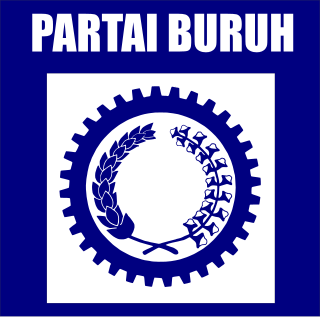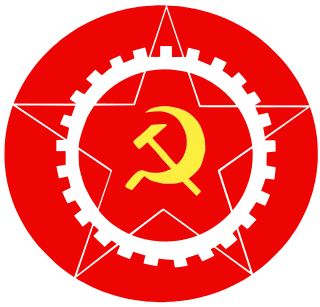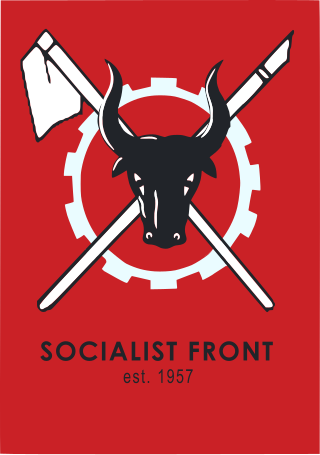Related Research Articles

Barisan Sosialis was a political party in Singapore. It was formed on 29 July 1961 and officially registered on 13 August 1961 by left-wing members of the People's Action Party (PAP) who had been expelled from the PAP. The prominent founding members of the Barisan were Lee Siew Choh and Lim Chin Siong. It became the biggest opposition party in Singapore in the 1960s and the 1980s.
Ahmad Boestamam, or Abdullah Thani bin Raja Kechil, was a Malaysian freedom fighter, politician and was the founding president of Parti Rakyat Malaysia and Parti Marhaen Malaysia. Abdullah was an editor and reporter for several newspapers which compelled him with the Ahmad pen-name honouring Indian freedom fighter Subhas Chandra Bose.

The National Front Party is a political party in Indonesia. It was founded by Vence Rumangkang, former member of the Democratic Party advisory board.

The Labour Party was a political party in Indonesia. It had its origins in the Indonesian Prosperous Laborers organization (SBSI), which in 1993 threw its support behind the Indonesian Democratic Party (PDI) as a vehicle for its political aspirations. When the PDI split in 1996, it allied itself with the breakaway faction led by Megawati Sukarnoputri, which led to it coming under pressure from the New Order government of President Suharto. On 30 July 1996, SBSI chairman Muchtar Pakpahan was detained on subversion charges. Following the fall of Suharto in 1998, the SBSI became disillusions with Megawati's now renamed Indonesian Democratic Party – Struggle and decided to establish its own party, the National Labour Party. After the failure in 1999 election, the party changed its name to Social Democrat Labour Party. The party stood in the 2004 Indonesian legislative election, but won only 0.6 percent of the vote and no legislative seats. Party chairman However, the party has 12 representatives in provincial assemblies. The party subsequently changed its name to the Labour Party.
Kongres Buruh Seluruh Indonesia was a trade union centre in Indonesia. It was politically linked to the Socialist Party of Indonesia (PSI). KBSI was founded in 1952, in an attempt from the socialists to counter the influence of the PKI-led SOBSI trade union centre.

The Labour Party of Indonesia was a political party in Indonesia.

The Labour Party was a political party in Indonesia. It was formed on 25 December 1949 by a group of former Labour Party of Indonesia (PBI) members, who had disagreed with the merger of PBI into the Communist Party of Indonesia.
The Consultative Body of Political Parties was a loose coalition of political parties in Indonesia. A preparatory meeting, which would lead to the formation of BPP, was held on 27 February 1951. The BPP was officially launched on March 31, 1951, and a Common Programme adopted. The BPP Common Programme was broadly nationalist. It called for an independent Indonesian foreign policy, and a break from the Round Table Conference agreement. Moreover, it called for the lifting of the state of War, nationalization of key industries, release of political prisoners, land reform, the right to strike, swift holding of elections and the return of West Irian to Indonesia.
The Fraction of Upholders of the Proclamation was a parliamentary group in the Indonesian People's Representative Council, formed after the 1955 parliamentary election. The group included ten Members of Parliament. The group was politically heterogenous, but was somewhat pro-Masjumi/Socialist Party of Indonesia.
Sentral Organisasi Buruh Republik Indonesia was an Indonesian trade union centre. SOBRI was founded in Bandung in 1951. SOBRI functioned as the trade union wing of the Murba Party.
Sarbuksi, short for Sarekat Buruh Kehutanan Seluruh Indonesia, was a trade union of forest workers in Indonesia. Sarbuksi was affiliated to the trade union centre SOBSI, which was linked to the Communist Party of Indonesia. During its existence, Sarbuksi was highly influential in regards to forestry policies in Indonesia. As of January 1962, Sarbuksi claimed a membership of a quarter million.
Sarbufis, short for Sarekat Buruh Film dan Sandiwara, was a trade union in Indonesia. Sarbufis was affiliated to the trade union centre SOBSI, which was linked to the Communist Party of Indonesia. As of January 1960, Sarbufis claimed a membership of 6,000. Kastari was the general secretary of Sarbufis.
Serbaud, short for Serikat Buruh Angkatan Udara, was a trade union of air transport employees and workers in Indonesia. Serbaud was affiliated to the trade union centre SOBSI, which was linked to the Communist Party of Indonesia. Serbaud was estimated to have less than 3,000 members.
Persatuan Buruh Kereta Api was a trade union of railway workers in Indonesia. It was affiliated with the Kongres Buruh Seluruh Indonesia (KBSI) trade union centre. PBKA was one of the key unions of KBSI. As of March 1958, PBKA claimed a membership of 32,000. PBKA was led by Dr. Kusna.

The Central All-Indonesian Workers Organization was the largest trade union federation in Indonesia. Founded during the period of the country's independence in the late 1940s, the federation grew rapidly in the 1950s. It was initially formed with loose connections to the Communist Party of Indonesia (PKI) and with members from other parties, but over time, the PKI became dominant in the organisation. With the introduction of President Sukarno's guided democracy in the late 1950s, SOBSI was formally recognised and given a place in the national decision-making structures. In the 1960s, SOBSI came into conflict with the Army, whose officers controlled the country's state enterprises. After the 1965 coup that subsequently produced Suharto's New Order regime, SOBSI was declared illegal, its members killed and imprisoned and most of the leadership executed.

The Malayan Peoples' Socialist Front or better known as Socialist Front (SF) or Barisan Sosialis (BS) was a left-wing coalition of Malaysian socialist parties. It was among the longest-standing opposition coalitions in Malaysian general election history. The coalition was formed by Parti Rakyat Malaya (PRM) and the Labour Party of Malaya on Hari Merdeka in 1957. In 1964, the National Convention Party (NCP) joined the coalition. PRM left the coalition in 1965 and NCP soon become inactive. The Labour Party, the only remaining party in SF, abandoned it on 10 January 1966 and reverted to its own banner.

The Indonesia omnibus law protests were a series of demonstrations and civil disorder against Indonesia's Omnibus Law on Job Creation which was passed on 5 October 2020 as well as President Joko Widodo. Demonstrations had begun on 13 January 2020 while the then-bill, claimed by the government as vital to boosting the country's manufacturing industry and foreign investment, was still being drafted. Protesters were concerned with the law's impact on the protection of the environment and working conditions.

The Labour Party is a political party in Indonesia founded on 5 October 2021. The party was reformed from and is a continuation of the defunct 1998 Labour Party founded by Muchtar Pakpahan. The party formed after the 4th Labour Party congress on 4–5 October in Jakarta.
The 2023 Omnibus Law on Job Creation, officially the Act No. 6 of 2023 On the Enaction of Government Regulation in Lieu of Act No. 2 of 2022 On Job Creation into Act is an Indonesian act which made the Government Regulation in Lieu of Act (Perpu) No. 2 of 2022 On Job Creation, a replacement of the Omnibus Law on Job Creation, permanent. The law was passed by the People's Representative Council on 21 March 2023. The law commenced on 31 March 2023.

Said Iqbal is an Indonesian labour activist and politician. He is the first president of the Labour Party, founded in 2021, and has served as president of the Indonesian Trade Union Confederation since 2012.
References
- ↑ Wieringa, Saskia. Sexual Politics in Indonesia . Houndmills, Basingstoke, Hampshire: Palgrave/Macmillan, 2002. p. 84
- ↑ "NGO AS OUTSIDE INTELLECTUAL" (PDF). Archived from the original (PDF) on 2008-07-24. Retrieved 2023-09-22.